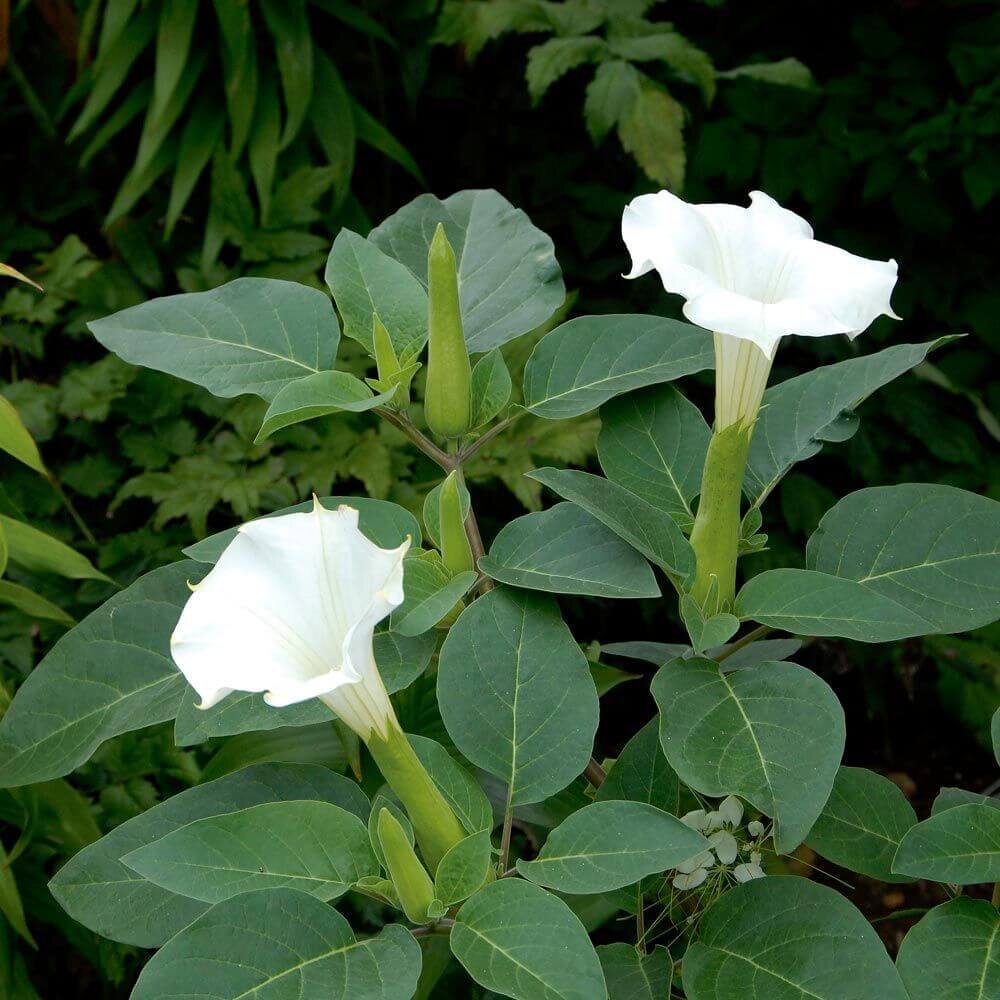Datura, Trumpet Flower (genus Datura)
Datura, Trumpet Flower (genus Datura)
Monthly Theme: Botanical names, common names, Latin names, regional names, which one is correct?!
I wanted to write this month about my Moonflower, Brugmansia, a lovely plant I started from seeds my son, Joshua, gave me years ago. However, once I started researching, I learned that I am not growing Brugmansia, but genus Datura! See, you can teach an old gardener new facts. The name Datura is from Sanskrit dhatūrao or thornapple. In fact, Datura is known by many names: Trumpet Flower, Floripondio, Jimsonweed, Devil's Trumpet, Indian Apple, Thornapples, and Horn of Plenty. Like so many other plants it gets confusing with the various names people recognize them by. Apparently, William Shakespeare was accurate when he wrote in Romeo and Juliet, “What’s in a name? That which we call a rose by any other name would smell as sweet.” Plants are often named by their appearance, their medical benefits, their fragrance or even folklore.
Datura or Trumpet flower is an herbaceous annual, but self-seeds robustly, which keeps them coming back yearly. This South American plant grows quickly and can reach 4’ tall. From late summer to autumn, at night, they produce large and fragrant trumpet-like flowers. Mine are pure white, but they also have purple, yellow, red, and lavender varieties. The velvety leaves and stems are a gray-green hue. Datura are smaller and less woody than Brugmansia, and the flowers bloom upright.
Even though Datura self-seed, I always save and dry the unique looking spiny seed pods (see the fruit photo below) for next year just in case they don’t come back on their own. They are super easy to grow from seed. Frankly, all they need is a sunny location and rich well-drained soil. Simply sow seeds directly outside in early spring after the last frost. If you prefer, you can grow then inside or in container gardens. In the spring, give them some flowering plant food high in nitrogen. If you’re like me, you’ll appreciate this low maintenance plant.
Here’s a tip for cut flower arrangements. You’ll discover they only last a short time when the stems are placed in water. However, if you cut off as much of the stem as possible, make a slit at the bottom of the flower, and partially submerge them in water, they will last a couple of days.
Smarty Plants Fun Facts
Plant Hardiness Zones 3-10 (9 to 10 as a perennial)
Datura belong to the family Solanaceae.
Plant Datura in well-drained soil in full sun.
Datura take about 3 to 6 weeks to germinate.
If leaves look droopy, it needs to be watered.
Datura seed pods referred to as fruit.
The More You Grow
Stepping over to the dark side, Datura is a genus of poisonous flowering plants belonging to the family Solanaceae. Throughout history, there have been stories about this plant being used to make poisons, witches' brews or love potions. Due to its toxicity and the shape of the flowers, they were granted the common name of Devil’s Trumpet. In some religions and cultures, Datura symbolizes a powerful and dangerous plant.
In Hinduism, Datura was offered to Shiva one of that religion’s principal deities. Since ancient times in India, Datura has been used in Ayurveda medicine. Some Native American tribes used Datura for its psychoactive properties. In recent history, from 1990-2000, there were reported tragedies of adolescents smoking or ingesting Datura, which in some cases resulted in an early death. Fortunately, accidental poisoning rare because of its unpleasant taste.
In 1825, Angel's Trumpet (Brugmansia) arrived in Hawaii. It became one of their sacred flowers that they called nanahonua, which means gazing earthward. Hawaiians smoked the leaves to create a hallucinogenic ritual. The Angel’s Trumpet flower faces downward while the Devil’s Trumpet (Datura) faces or blooms upward.
Trumpet flowers are linked to angels and celestial powers whose iconography include a trumpet such as Gabriel. Again, the shape of the flower is one of the reasons they are commonly called Trumpet flowers.
Wild Jimsonweed (also known as Devil’s Weed, Hell’s Bells) is quite toxic (especially their seeds and flowers) and may cause hallucinatory effects. Be advised to wear gloves when working with this species of the Datura plants. As a member of the nightshade family, Jimsonweed was used to treat epilepsy and has been associated with witchcraft.
Bottom line – don’t even consider eating or smoking this plant instead take a stroll outside in the evening and enjoy the glory of Datura’s astonishing flowers and luscious fragrances! In the meantime, I’ll try to remember to introduce my plants as Trumpet flowers and not erroneously as Moonflowers.


